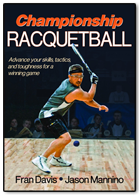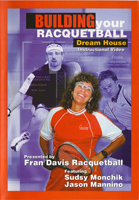Game Situations and Strategies
[caption id="attachment_1646" align="alignright" width="200"] Coach Fran Davis[/caption] A strategy is a method of achieving a specific goal or end result, which is to play your best to win the match. Your strategy helps you carry out your plan. If you just step out on the court without a plan and a particular strategy, you will be doomed from the start. You will always be reacting to the situation rather than creating the situation. You are in a much better position to win when creating the situation right from the beginning of the match. (more…)










